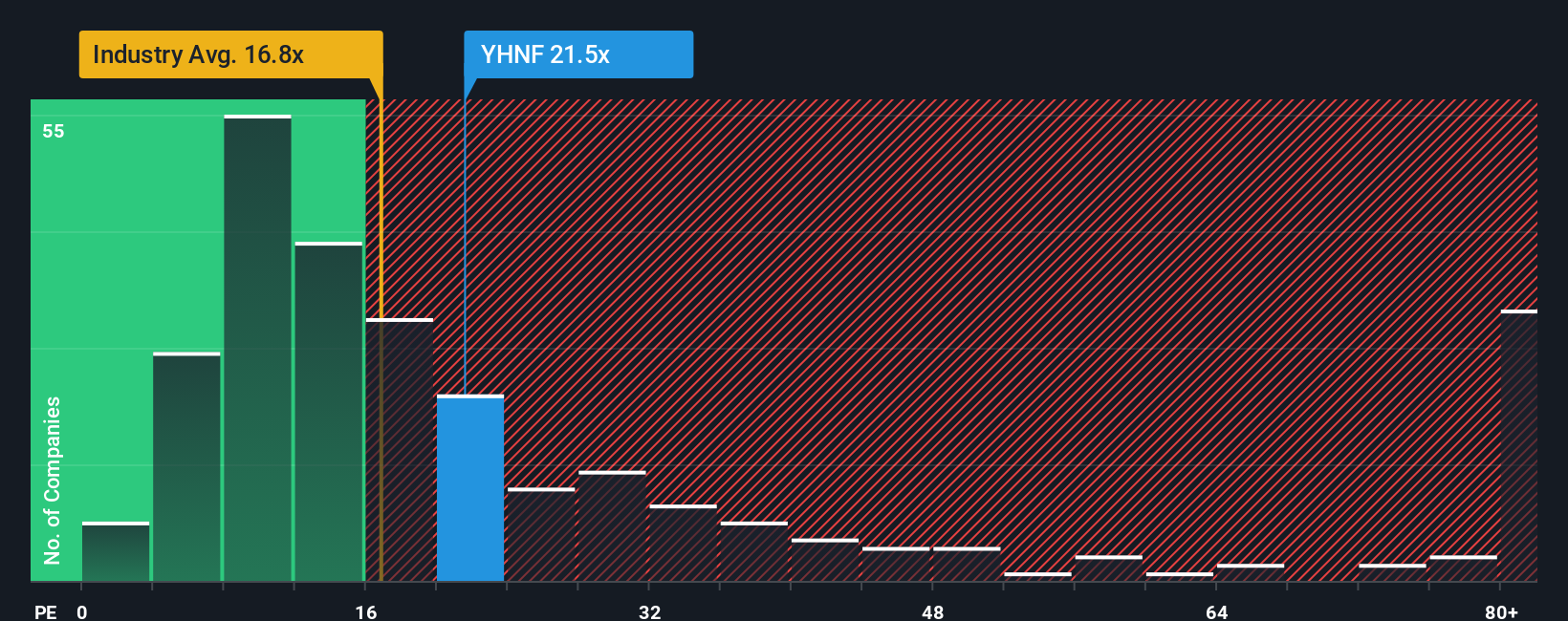- Israel
- /
- Food and Staples Retail
- /
- TASE:YHNF
M.Yochananof and Sons (1988) Ltd's (TLV:YHNF) Shares May Have Run Too Fast Too Soon
With a price-to-earnings (or "P/E") ratio of 21.5x M.Yochananof and Sons (1988) Ltd (TLV:YHNF) may be sending bearish signals at the moment, given that almost half of all companies in Israel have P/E ratios under 15x and even P/E's lower than 10x are not unusual. However, the P/E might be high for a reason and it requires further investigation to determine if it's justified.
Recent times have been quite advantageous for M.Yochananof and Sons (1988) as its earnings have been rising very briskly. It seems that many are expecting the strong earnings performance to beat most other companies over the coming period, which has increased investors’ willingness to pay up for the stock. You'd really hope so, otherwise you're paying a pretty hefty price for no particular reason.
See our latest analysis for M.Yochananof and Sons (1988)

How Is M.Yochananof and Sons (1988)'s Growth Trending?
In order to justify its P/E ratio, M.Yochananof and Sons (1988) would need to produce impressive growth in excess of the market.
Taking a look back first, we see that the company grew earnings per share by an impressive 39% last year. The latest three year period has also seen a 23% overall rise in EPS, aided extensively by its short-term performance. So we can start by confirming that the company has actually done a good job of growing earnings over that time.
Comparing that to the market, which is predicted to deliver 23% growth in the next 12 months, the company's momentum is weaker based on recent medium-term annualised earnings results.
With this information, we find it concerning that M.Yochananof and Sons (1988) is trading at a P/E higher than the market. Apparently many investors in the company are way more bullish than recent times would indicate and aren't willing to let go of their stock at any price. Only the boldest would assume these prices are sustainable as a continuation of recent earnings trends is likely to weigh heavily on the share price eventually.
What We Can Learn From M.Yochananof and Sons (1988)'s P/E?
While the price-to-earnings ratio shouldn't be the defining factor in whether you buy a stock or not, it's quite a capable barometer of earnings expectations.
We've established that M.Yochananof and Sons (1988) currently trades on a much higher than expected P/E since its recent three-year growth is lower than the wider market forecast. When we see weak earnings with slower than market growth, we suspect the share price is at risk of declining, sending the high P/E lower. If recent medium-term earnings trends continue, it will place shareholders' investments at significant risk and potential investors in danger of paying an excessive premium.
Many other vital risk factors can be found on the company's balance sheet. Take a look at our free balance sheet analysis for M.Yochananof and Sons (1988) with six simple checks on some of these key factors.
It's important to make sure you look for a great company, not just the first idea you come across. So take a peek at this free list of interesting companies with strong recent earnings growth (and a low P/E).
New: Manage All Your Stock Portfolios in One Place
We've created the ultimate portfolio companion for stock investors, and it's free.
• Connect an unlimited number of Portfolios and see your total in one currency
• Be alerted to new Warning Signs or Risks via email or mobile
• Track the Fair Value of your stocks
Have feedback on this article? Concerned about the content? Get in touch with us directly. Alternatively, email editorial-team (at) simplywallst.com.
This article by Simply Wall St is general in nature. We provide commentary based on historical data and analyst forecasts only using an unbiased methodology and our articles are not intended to be financial advice. It does not constitute a recommendation to buy or sell any stock, and does not take account of your objectives, or your financial situation. We aim to bring you long-term focused analysis driven by fundamental data. Note that our analysis may not factor in the latest price-sensitive company announcements or qualitative material. Simply Wall St has no position in any stocks mentioned.
About TASE:YHNF
M.Yochananof and Sons (1988)
Engages in the marketing and retail trade in the food and related products in Israel.
Proven track record with mediocre balance sheet.
Similar Companies
Market Insights
Community Narratives


Recently Updated Narratives


MINISO's fair value is projected at 26.69 with an anticipated PE ratio shift of 20x


The Quiet Giant That Became AI’s Power Grid


Nova Ljubljanska Banka d.d will expect a 11.2% revenue boost driving future growth
Popular Narratives


The company that turned a verb into a global necessity and basically runs the modern internet, digital ads, smartphones, maps, and AI.


MicroVision will explode future revenue by 380.37% with a vision towards success



